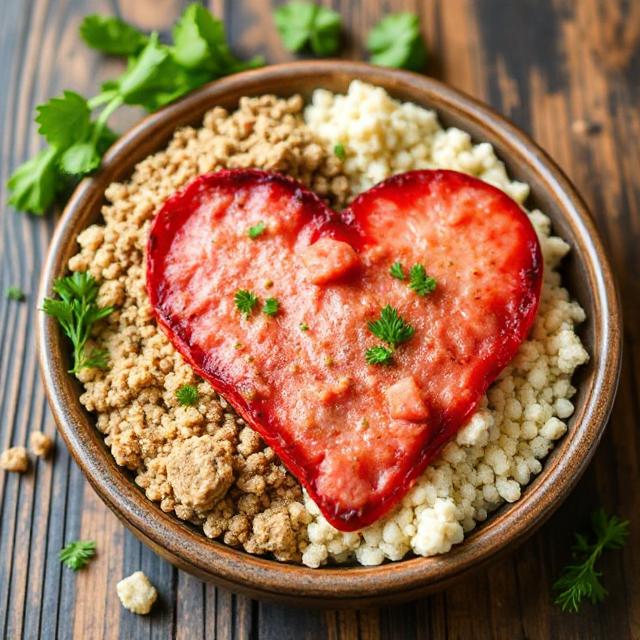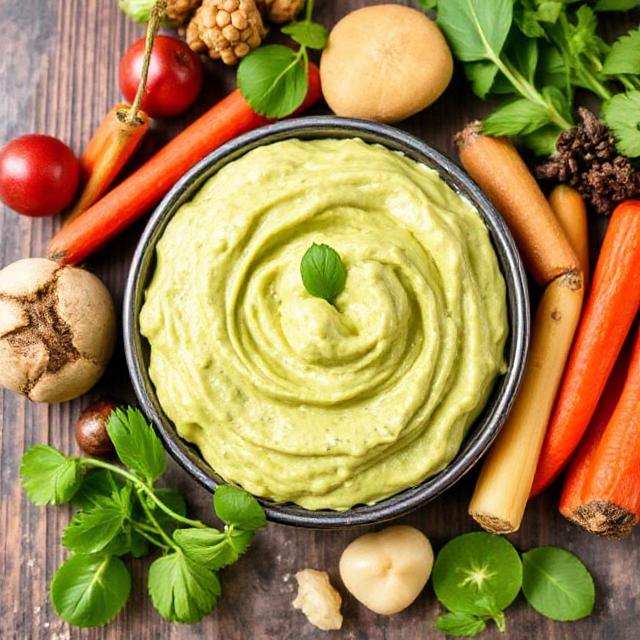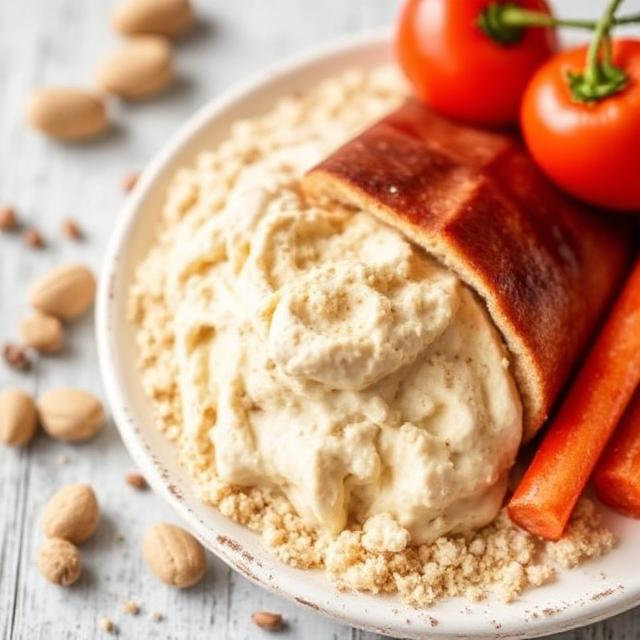Last Updated on June 22, 2025 by Irshad Quadri
Why Gluten-Free Protein Is a Game-Changer for Heart Health
Due to today’s fast-paced lifestyle and unhealthy eating habits, cholesterol problems have become very common. People are facing the issue of high LDL (also known as “bad cholesterol”), which increases the risk of heart diseases. Therefore, it has become very important to make some important changes in your diet.
Key Points:
- Rising Cholesterol Issues:
- Due to today’s unhealthy eating habits, processed foods, and sedentary lifestyle, cholesterol levels are increasing.
- High LDL cholesterol blocks arteries, which can increase the risk of heart attack and stroke.
Why People Are Switching to Gluten-Free Diets:
- People are switching to gluten-free foods due to gluten sensitivity, allergies, and digestive issues.
- Gluten-free diet reduces inflammation and improves overall health.
Importance of High-Protein Diets for Heart Health:
- High-protein foods, especially plant-based sources, help lower LDL cholesterol levels.
- Protein-rich foods improve digestion, increase energy levels, and also support weight management.
Cholesterol-Lowering Gluten-Free Protein Sources:
- Choose foods that are cholesterol-friendly and gluten-free. – These foods not only provide health benefits, but are also tasty.
Why Choose Gluten-Free, High-Protein Foods?
- Plant-Based Proteins:
- Legumes, beans, lentils, quinoa, chia seeds, and nuts like options naturally reduce LDL levels.
Cholesterol-Friendly Foods:
- Nuts (almonds, akhrot), seeds (chia, flaxseeds), and green vegetables help in controlling your cholesterol.
Best Gluten-Free Protein Sources:
- Fish, chicken, eggs (if non-vegetarian), and dairy products are also gluten-free.
- Tofu, tempeh, and plant-based protein powders are also healthy options.
Teaser:
In the next article, we’ll share the best gluten-free protein foods, powders, and easy meal ideas that will boost your overall health while reducing cholesterol.
Conclusion:
If you want to protect your heart health, incorporating gluten-free and high-protein foods into your diet is a smart decision. These foods not only control cholesterol, but also lead you to a healthier lifestyle. So, get ready to upgrade your diet!
Table of Contents
Can Gluten-Free Protein Really Lower Cholesterol?
In today’s health-conscious world, people are very curious whether gluten-free protein actually helps in lowering cholesterol. The answer to this question is yes! Properly selected gluten-free protein sources not only fulfill your daily protein needs but can also significantly reduce LDL (bad cholesterol). Let’s understand this connection in detail.
How Protein Helps in Reducing LDL?
Protein is a very important nutrient for holistic health. When we take high-quality, plant-based, and gluten-free proteins, they help in controlling our blood cholesterol levels.
Role of protein in lowering LDL cholesterol:
- Protein helps make enzymes and hormones in your body, which play an important role in cholesterol synthesis and metabolism.
- Plant-based proteins such as lentils, beans, chickpeas, and nuts also contain fiber, which prevents cholesterol absorption and keeps the blood vessels clean.
- Dietary protein improves health, which prevents overeating and unhealthy snacking, which indirectly controls cholesterol levels.
Protein and heart health:
- According to research, high-protein diets, especially plant-based sources, can reduce LDL levels by 10-15%. – Protein intake also keeps your overall weight under control, which is very essential for heart health.
What Does Gluten-Free Protein Mean?
In simple words, gluten-free protein means those protein sources that are free from a protein called gluten. Gluten is a protein found in grains like wheat, barley, and rye. Gluten-free diet is for people who suffer from gluten sensitivity, celiac disease, or gluten intolerance.
Gluten-free protein sources:
- Legumes (lentils, chickpeas, beans)
- Nuts and seeds (almonds, chia seeds, flaxseeds)
- Quinoa, amaranth, buckwheat (grain alternatives)
- Fish, chicken, eggs, dairy (if non-vegetarian)
- Plant-based protein powders (such as pea protein, rice protein)
The common feature of all these is that they are gluten-free and also high-protein. Such foods are safe and effective for heart health, as they help in naturally reducing LDL cholesterol.
A Stat That Speaks Volumes
A recent study published in 2022 showed that plant-based protein reduced cholesterol levels by up to 15%. This study also shows that regular consumption of plant-based and gluten-free proteins, especially those that are fiber-rich, can significantly reduce LDL cholesterol.
Link to study: American Heart Association
Summary
- Protein, especially plant-based and gluten-free sources, are effective in reducing LDL cholesterol.
- Gluten-free protein simply means those proteins that are free from gluten, like pulses, nuts, seeds, fish, eggs, and gluten-free grains. – According to 2022 research, plant-based proteins can reduce cholesterol by up to 15%.
If you want to improve your heart health, adding gluten-free, high-protein foods to your diet is a smart step. This not only controls cholesterol, but also leads you to a healthier lifestyle. So, make your diet gluten-free and protein-rich, and make your heart health strong!
High Protein Gluten Free Foods for Heart Health (Animal-Based)

If you want to know about animal-based gluten-free protein sources that can boost your heart health, then this list will be very helpful for you. These foods are rich in not only protein but also omega-3 fatty acids, vitamins, and minerals, which are very good for heart health. Let’s know in detail about the top 5 animal-based gluten-free protein sources.
1. Salmon (Omega-3 + Protein)
Salmon is a superfood that should be included in your diet, especially if you give priority to heart health.
- Why it’s beneficial:
- Rich in omega-3 fatty acids, which reduce bad cholesterol (LDL) and increase good cholesterol (HDL).
- High-quality protein helps build and repair your muscles.
- Salmon is a perfect choice to reduce the risk of heart disease.
- Tip:
- Grill salmon and eat it, don’t fry it! Frying adds unnecessary unhealthy fats, which are not good for heart health.
2. Eggs (With or Without Yolk?)
Eggs are a complete protein source, which easily fulfill your daily protein requirement.
- Know this:
- Egg yolk contains cholesterol, but according to recent research, moderate egg consumption (1-2 eggs per day) is safe for the heart.
- Egg whites contain only protein, so if you want to keep cholesterol under control, prefer egg whites.
- Tip:
- Eat whole eggs or just egg whites – both options are healthy.
- Cooking method: Boiled, steamed, or scrambled—it is better to grill or bake, don’t fry!
3. Chicken Breast (Lean Protein)
Chicken breast is a lean meat that can be easily included in your diet.
- Why it’s good for heart health:
- Low in saturated fats, high in protein.
- Along with building muscles, it also controls LDL cholesterol.
- Quick and easy to prepare, grilling is best.
- Tip:
- Grill the chicken breast, do not fry it! Frying adds extra fats, which can increase cholesterol.
4. Greek Yogurt (Low-Fat)
Greek yogurt is a probiotic-rich dairy product that improves digestion and is also beneficial for the heart.
- Health benefits:
- Rich in Protein, which makes you feel full and prevents unhealthy snacking. – Choose low-fat options to avoid saturated fats.
- It is also rich in calcium and probiotics, which is good for overall health.
- Tip:
- Serve Greek yogurt with fresh fruits, honey, or nuts.
- Instead of baking or grilling, include it in raw or steamed dishes.
5. Cottage Cheese (Paneer – Indian Context)
Paneer or cottage cheese is a very healthy protein source that easily fits into the Indian diet.
- Why it’s heart-friendly:
- Low in saturated fats, high in protein. – Rich in calcium and phosphorus, which are good for bones and teeth.
- An excellent protein alternative for vegetarians.
- Tip:
- Eat paneer by grilling, baking or steaming it.
- Avoid frying as extra oil can increase cholesterol.
Bonus Tip:
“Grill it, don’t fry!”
For healthy eating, prepare these animal-based protein foods by grilling, baking or steaming them. Frying increases unhealthy fats, which can increase the risk of heart disease.
Conclusion:
These top 5 animal-based gluten-free protein foods are very beneficial for your heart health. By including them in your diet, you can naturally control LDL cholesterol, and move towards a healthier, heart-friendly lifestyle. Remember, adopting healthy cooking methods like grilling, baking, and steaming is very important for overall well-being!
Also Read: 10 Best Low-Carb Low-Cholesterol Breakfast Ideas
Plant Based Proteins to Reduce Cholesterol (Vegan Friendly)

Nowadays, health experts and nutritionists are all focusing on one thing — plant-based proteins. These proteins not only help in reducing cholesterol, but also boost your overall health. These foods are perfect for vegans and vegetarians, who are also gluten-free and heart-friendly. If you want to include plant-based proteins in your diet and want to control cholesterol level naturally, then this list will be very useful for you.
Let’s know in detail about top 7 plant-based proteins, which can help you in reducing cholesterol.
1. Lentils (Dal) – Heart-Healthy Protein
Lentils, i.e. dal, is a very common and affordable plant-based protein source.
- Why lentils are good for cholesterol:
- Rich in dietary fiber, which reduces blood cholesterol and keeps the arteries clean.
- Protein content is high, which helps in building and repairing muscles.
- Lentils have low fat, so it is a safe choice for the heart.
Tip:
Cook lentils without extra oil, and use herbs and spices for flavor.
2. Chickpeas (Garbanzo Beans) – Fiber-Rich Protein
Chickpeas or garbanzo beans are one of the best plant protein options for heart health.
- Chickpeas benefits:
- High in soluble fiber, which prevents cholesterol from getting deposited in the arteries.
- Along with protein, it also provides vitamins and minerals.
- Can boost health by including them in salads, soups, and hummus.
Tip:
Eat roasted or boiled chickpeas as snacks without frying.
3. Tofu – Vegan Protein Powerhouse
Tofu, which is made from soy milk, is an excellent plant-based protein source.
- Tofu health benefits:
- Low in saturated fats, cholesterol-free, and protein-rich.
- Beneficial for the heart, as it contains phytoestrogens which help lower cholesterol.
- Versatile, can be used in stir-fries, salads, and smoothies.
Tip:
Make grilled or steamed tofu, do not fry it.
4. Quinoa – Complete Protein with Cholesterol-Lowering Properties
Quinoa is a pseudo-grain that is a complete plant protein, meaning it contains all the essential amino acids.
- Why quinoa is beneficial:
- High in fiber, which reduces LDL cholesterol.
- Gluten-free and easy to digest.
- Can be served in breakfast bowls, salads, or as a side dish.
Tip:
Boil Quinoa and serve it in salads or as a side dish.
5. Amaranth – Ancient Grain for Heart Health
Amaranth is a traditional grain that helps in cholesterol control.
- Benefits of Amaranth:
- Rich in fiber, which reduces blood cholesterol levels.
- Protein content is also high, which is beneficial for muscle growth.
- Ideal for reducing the risk of heart disease.
Tip:
Eat Amaranth as breakfast by making it into porridge.
6. Chia Seeds – Small But Mighty
Chia seeds are a tiny superfood that is rich in omega-3 fatty acids, fiber, and protein.
- Benefits of Chia seeds:
- Rich in soluble fiber, which prevents cholesterol from getting deposited in the arteries.
- Good for hydrating and digestion.
- Consume with smoothies, oats, or yogurt.
Tip:
Soak chia seeds in water or milk and eat them as a pudding.
Also Read: Gluten-Free Oats and Beyond: 7 Surprising Foods to Lower Cholesterol Naturally
7. Hemp Hearts – Plant-Based Protein for Heart Support
Hemp seeds, or hemp hearts, are a complete plant protein that helps control cholesterol.
- Health benefits of Hemp hearts:
- Rich in healthy omega-3 and omega-6 fatty acids.
- High-quality protein source, which builds muscles and supports overall health.
- Along with heart-friendly fats, naturally lowers cholesterol levels.
Tip:
Sprinkle hemp hearts in salads, smoothies, or oats.
Protein vs Cholesterol Impact Chart
| Food Item | Protein Content (per 100g) | Cholesterol Impact (Approximate) |
|---|---|---|
| Lentils | 9g | Reduces LDL cholesterol |
| Chickpeas | 8.9g | Lowers blood cholesterol |
| Tofu | 8g | Cholesterol-free, supports heart |
| Quinoa | 4.4g | Lowers LDL, high fiber |
| Amaranth | 13g | Reduces total cholesterol |
| Chia Seeds | 17g | Lowers LDL, high omega-3 |
| Hemp Hearts | 32g | Supports healthy fats, reduces cholesterol |
(Note: Impact varies based on individual diet and lifestyle)
Also Read: 10 Best Gluten-Free Foods to Lower Cholesterol (Backed by Science)
Best Gluten Free Protein for Lowering LDL Cholesterol

If you want to include gluten-free protein powders in your diet that will help lower LDL cholesterol (also known as bad cholesterol), then this list will be very useful for you. In today’s health-conscious times, many people are moving towards gluten-free options due to gluten intolerance and celiac disease. In this article, we are telling you about the best gluten-free protein powders that naturally lower LDL cholesterol as well as fulfill your daily protein requirements.
Let’s go into detail about these gluten-free protein powders that support your heart health.
1. Brown Rice Protein – Plant-Based Heart-Healthy Protein
Brown rice protein is an excellent vegan and gluten-free option that helps lower LDL cholesterol.
- Health benefits:
- Rich in essential amino acids, which are essential for muscle repair and growth.
- High in fiber, which naturally controls blood cholesterol levels.
- Easy to digest and allergen-free, making it suitable for sensitive stomachs.
Pro Tip:
Include this protein powder in smoothies, shakes, or baking recipes.
2. Pea Protein – Excellent Plant-Based Source for Lowering LDL
Pea protein is a popular vegan protein powder that is very effective in reducing LDL cholesterol.
- Why pea protein is beneficial:
- Reduces cholesterol levels naturally.
- Rich in iron and other nutrients, which boost overall immunity.
- There is no need to worry about allergic reactions since it is gluten-free, dairy-free, and soy-free.
Use:
Use Pea Protein in smoothies, energy balls, and protein bars.
3. Vegan Protein Blends – Complete Nutrition for Heart Health
Vegan protein blends, like mixed plant-based protein powders, are made from multiple sources and provide a balanced amino acid profile.
- Advantages:
- Combination of multiple plant proteins, which improves digestion and absorption.
- Naturally reduces LDL cholesterol.
- Gluten-free and dairy-free, suitable for everyone.
Best for:
Ideal for post-workout recovery, breakfast shakes, or weight management.
4. Whey Isolate (Only if Verified Gluten-Free)
Whey protein, which is made from dairy, is a complete protein source.
- Important:
- Whey isolate, which is a highly processed and purified form, must be verified to be gluten-free.
- If you do not have a gluten intolerance, whey isolate may help lower LDL cholesterol as it is easily digestible and high in protein content.
Note:
Always check labels for gluten-free certification before purchasing.
Affiliate Shopping Links
You can easily purchase these products from Amazon. By clicking on these links, you will find the best gluten-free protein powders that help lower LDL cholesterol.
Conclusion:
Gluten-free protein powders are a powerful tool for achieving your health goals, especially if you want to lower LDL cholesterol naturally. Brown rice protein, pea protein, vegan blends, and verified gluten-free whey isolate are all the best options for a healthy lifestyle. By incorporating them into your diet, you can support cardiovascular health and enjoy a balanced, gluten-free diet.
Choose wisely, and start your journey towards a healthier heart today!
Cholesterol Friendly Protein Rich Foods Without Gluten – Meal Plan Ideas

If you want to incorporate gluten-free and cholesterol-friendly protein foods into your diet, this sample meal plan is perfect for you. These healthy meal ideas will not only help lower your LDL cholesterol but will also provide you with energy, nutrition, and safety.
By following these meal options, you can incorporate easy, tasty, and heart-healthy foods into your daily routine. And yes, if you want, we have also created a free downloadable 3-day meal plan PDF that you can easily download.
Let’s now see this cholesterol-friendly, protein-rich gluten-free meal plan in detail.
1. Breakfast: Quinoa Porridge with Chia Seeds
For breakfast, quinoa porridge is a perfect option which is rich in both protein and fiber.
- Why this meal is good for cholesterol:
- Quinoa (complete plant protein) and chia seeds (omega-3 fatty acids and fiber) naturally reduce LDL cholesterol.
- Due to low glycemic index, blood sugar levels remain in control which is beneficial for overall heart health.
How to prepare:
- Wash and boil ½ cup quinoa.
- Add some almond milk or coconut milk.
- Sprinkle chia seeds on top and add fresh fruits like berries or banana slices and enjoy.
2. Lunch: Grilled Paneer with Amaranth Salad
For afternoon snack, make a nutritious amaranth salad with grilled paneer.
- Health benefits:
- Paneer provides high-quality protein and calcium.
- Amaranth is an ancient grain that reduces cholesterol and is rich in fibre and amino acids.
- This meal will provide you energy and keep your heart healthy.
How to prepare:
- Marinate the paneer cubes (a little lemon juice, herbs, spices).
- Grill till golden. – Boil amaranth, add vegetables (cucumber, tomato, spinach) to salad, and toss with olive oil, lemon, salt, and pepper.
3. Snack: Roasted Chickpeas
Roasted chickpeas are perfect for a healthy snack in the middle of the day.
- Why this snack is heart-friendly:
- High in soluble fiber, which controls blood cholesterol.
- Rich in protein and minerals, supports healthy digestion.
- Gluten-free and easy to prepare.
How to prepare:
- Soak chickpeas overnight, then boil.
- Apply a little olive oil, salt, paprika, and spices and roast in oven till crispy.
- Enjoy it as a snack, or add it to salads.
4. Dinner: Tofu Stir-Fry with Brown Rice
For the final meal of the day, tofu stir-fry with brown rice is a nutritious and satisfying option.
- Health benefits:
- Tofu (soy-based protein) helps reduce LDL cholesterol.
- Brown rice is a complex carbohydrate that stabilizes blood sugar levels.
- Vegetables like broccoli, bell peppers, and carrots provide fiber and antioxidants.
How to prepare:
- Cut tofu into cubes and marinate (ginger, garlic, soy sauce).
- Stir-fry with vegetables in olive oil or sesame oil.
- Serve cooked brown rice alongside.
Download Your Free 3-Day Cholesterol-Friendly Meal Plan PDF!
If you want to make your diet even more organized and easy, we have prepared a free downloadable 3-day meal plan PDF. In it you will find detailed recipes for breakfast, lunch, snacks, and dinner, specially designed to naturally lower your LDL cholesterol.
Download Your Free 3-Day Meal Plan PDF Here
Conclusion
These cholesterol-friendly, protein-rich, gluten-free meal ideas will help you adopt a healthy lifestyle. By incorporating these meals into your daily routine, you can not only control your LDL cholesterol levels but also boost your overall health.
Start healthy eating here — begin your healthy journey with tasty, nutritious, and heart-friendly foods!
Trusted Sources
Bonus Section
Top 11 Cholesterol-Lowering Gluten-Free Protein Sources – Backed by Science
Today, many people want to control their cholesterol levels to avoid heart-related problems. And having a good protein source is very important, especially if you are following a gluten-free diet. According to scientific research, these 11 gluten-free proteins not only make your diet healthy, but also help in reducing cholesterol naturally. Let’s learn about these top 11 protein sources!
1. Quinoa
Quinoa is a complete protein, containing all the essential amino acids. It is gluten-free and rich in fiber, which helps lower LDL cholesterol. Scientific studies show that eating quinoa improves heart health.
2. Chia Seeds
Chia seeds are rich in omega-3 fatty acids, fiber, and antioxidants. They reduce cholesterol levels as well as inflammation, which is beneficial for the heart.
3. Amaranth
Amaranth is a pseudo-cereal that is rich in protein, fiber, and micronutrients. According to research, it is effective in lowering LDL cholesterol and is a perfect choice in a gluten-free diet.
4. Lentils (Dal)
Lentils are a good source of protein, fiber, and antioxidants. Multiple scientific studies have suggested that regular lentil consumption naturally reduces LDL cholesterol and boosts heart health.
5. Chickpeas (Kabuli Chana)
Chickpeas contain soluble fiber that prevents cholesterol absorption. They are also gluten-free and are a good option for a heart-friendly diet.
6. Tofu
Tofu is a soy-based protein that is an excellent choice for a plant-based diet. According to research, regular consumption of tofu reduces LDL cholesterol levels and is beneficial for heart health.
7. Tempeh
Tempeh is a fermented soy product that also contains probiotics. It also helps lower cholesterol and supports gut health.
8. Nuts (Almonds, Walnuts)
Nuts contain healthy monounsaturated fats and fiber, which naturally reduce LDL cholesterol. Scientific studies have confirmed that eating nuts daily reduces the risk of heart disease.
9. Pumpkin Seeds
Pumpkin seeds are rich in zinc, magnesium, and healthy fats. They help control cholesterol levels and improve overall heart health.
10. Sunflower Seeds
Sunflower seeds contain phytosterols, which block cholesterol absorption. They are also perfect for a gluten-free and cholesterol-lowering diet.
11. Hemp Seeds
Hemp seeds are rich in omega-3 and omega-6 fatty acids, which help lower LDL cholesterol. These seed-based proteins are scientifically proven to be good for heart health.
Backed by Science
All these gluten-free protein sources naturally reduce cholesterol according to scientific research. By including these foods in your diet regularly, you can improve your heart health, and effectively manage cholesterol levels.
If you also want to make your diet more healthy, include these protein sources in your daily meals!
Do you have a favorite gluten-free protein? Let us know in the comments!
And yes, download your free gluten-free high-protein meal chart — a simple tool that will make your healthy eating journey easier!
FAQs (Frequently Asked Questions) – All You Need to Know About Gluten-Free, Protein-Rich Diets for Cholesterol Management
1. Is whey protein gluten-free?
Whey protein, especially whey isolate, can be gluten-free, but it’s essential to check product labels for gluten-free certification. Many brands process whey in facilities that also handle gluten, which can lead to cross-contamination. Always choose verified gluten-free whey protein to ensure it’s safe for gluten sensitivities or celiac disease.
2. How much protein do I need daily for cholesterol management?
The recommended dietary allowance (RDA) for protein varies based on age, sex, and activity level. For managing cholesterol, aiming for about 0.8 to 1.2 grams of protein per kilogram of body weight daily can help. Incorporating plant-based proteins like peas, quinoa, and amaranth can be particularly effective in supporting heart health while meeting your protein needs.
3. Can a gluten-free diet alone lower cholesterol?
While a gluten-free diet can help reduce inflammation and improve overall health, it alone may not significantly lower LDL cholesterol. Combining a gluten-free diet with heart-healthy foods rich in soluble fiber, healthy fats, and plant-based proteins is more effective for managing cholesterol levels.
4. Are plant-based proteins enough for heart health?
Yes, plant-based proteins such as peas, quinoa, chia seeds, and amaranth are excellent for heart health. They are naturally low in saturated fats and high in fiber, antioxidants, and essential nutrients that help reduce LDL cholesterol and improve cardiovascular health.
5. Can I get enough protein from a vegan or vegetarian gluten-free diet?
Absolutely! By including a variety of plant-based proteins like lentils, chickpeas, tofu, tempeh, nuts, and seeds, you can easily meet your daily protein requirements while supporting your heart health and maintaining a gluten-free lifestyle.
6. Are all gluten-free protein powders suitable for lowering LDL?
Not all gluten-free protein powders are created equal. Look for options that are high in fiber and free from added sugars or unhealthy fats. Brown rice, pea, and vegan blend protein powders are particularly effective in helping lower LDL cholesterol.
7. What are some good sources of gluten-free, cholesterol-lowering proteins?
Some of the best sources include quinoa, chia seeds, amaranth, lentils, chickpeas, tofu, and specially formulated gluten-free protein powders like pea and rice protein. Incorporating these into your diet can help you manage cholesterol levels effectively.
Need more personalised advice?
Consult with a healthcare professional or a registered dietitian to create a tailored plan that best suits your health needs and dietary preferences.
Switch Smart: Add These Gluten-Free Proteins to Your Cholesterol-Lowering Diet
Incorporating the right gluten-free, plant-based proteins into your daily meals is a powerful step toward managing your cholesterol levels and promoting heart health. As we’ve explored, foods like quinoa, chia seeds, amaranth, lentils, chickpeas, and tofu are not only delicious but also packed with essential nutrients that support a healthy, cholesterol-friendly lifestyle. These proteins are naturally gluten-free, rich in fiber, and contain healthy fats that help lower LDL cholesterol while providing sustained energy.
Remember, a balanced diet that emphasizes whole, plant-based, and gluten-free foods can make a significant difference in your overall health. Combining these protein sources with other heart-healthy habits, such as regular exercise and reducing saturated fats, will give you the best results.
We’d love to hear from you! Which gluten-free protein is your favorite? Drop your answer in the comments below and share your experiences or tips for incorporating these nutritious foods into your diet.
And don’t forget — for an easy, organized way to plan your meals, download your free gluten-free high-protein meal chart. It’s a simple tool to help you stay on track and make healthier choices every day.
Take charge of your heart health today — switch smart, eat well, and feel great!
Affiliate Disclosure
This blog contains affiliate links, meaning I may earn a small commission if you purchase through these links, at no extra cost to you. I only recommend products I trust and believe will benefit my readers. Your support helps keep this site running—thank you! 🙌

About the Author
Irshad Quadri is a Health & Wellness blogger who simplifies topics like cholesterol management, weight loss, and heart health for everyday readers. On iq4u81.blog, he shares science-backed diet tips, easy recipes, and practical guides to help people live healthier — without losing the joy of food.

